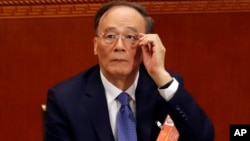China's once powerful anti-corruption chief, Wang Qishan, appears poised to make a comeback, just a few months after many thought he was moving into retirement. Wang — who will be 70 years old this July — is widely expected to be elected as China's vice president on Saturday during a meeting of the country’s top legislature.
And the key job many see Wang focusing on — given his background and close relationship with China’s powerful leader, Xi Jinping — is serving as Xi’s go-to person on handling relations with the United States at a time when trade tensions are rising.
Washington already has enacted a series of trade penalties targeting China and more are expected in the weeks ahead. U.S. President Donald Trump has said he wants China to slash $100 billion off Washington’s trade deficit with the world’s second economy.
Wang has a long track record of handling tough situations, both domestically and internationally. He previously served as China’s top economic representative in high-level security and economic talks with Washington, during the administrations of both former presidents George W. Bush and Barack Obama.
He certainly has the background and the capacity to be given an important task like handling U.S.-China relations, said Sun Yun, director of the China Program at the Stimson Center, a Washington-based research group.
“Wang Qishan has a good reputation here in Washington, he is regarded as an effective and capable fixer,” she said, adding he is "a leader that can make difficult decisions and a very approachable negotiation partner.”
Sun said that when Trump visited Beijing last November she heard a story about how during one meeting with Xi, the president pointed to U.S. Trade Representative Robert Lighthizer and singled him out as the person in charge of trade negotiations with China.
“I think from Xi Jinping’s perspective I am sure he would like to do the same thing,” Sun said. “And if Wang Qishan is indeed picked as the person to handle U.S.-China relations, to me, that sounds like Xi Jinping’s reaction to Trump saying to him that this is the guy who will be in charge of the trade negotiations.”
Rare move
Xi’s decision to allow Wang to stay around after stepping down as the party’s anti-corruption chief, is a rare and what some analysts call bold move. If selected, Wang will be the first ordinary party member to serve as vice president since the early 1990s. When Xi Jinping, Hu Jintao and Zeng Qinghong all served as vice president they were also members of the party’s powerful Politburo Standing Committee.
“Even though he's not a member to the Politburo Standing Committee, Wang is still tapped to be China's vice president. That shows how much power Xi is willing to grant him," said Wang Kun-yi, an adjunct professor at Tamkang University in Taiwan.
And with Wang Qishan by his side, Xi won’t feel alone, he adds.
“Wang Qishan has spearheaded Xi's battle on graft since the 18th party congress, so, the both men's fate is intertwined (as political partners)," he said.
A massive anti-corruption drive that Xi has led since rising to power has already investigated more than one million party members, winning praise from the public for helping weed out low-level graft and eliminating Xi’s political rivals.
Based on Wang Qishan’s performance as China’s anti-corruption head, it’s unlikely that Xi is keeping him around to go soft on Washington, analysts note.
"Given his track record in fighting corruption, he's a tough man. I don't think Xi Jinping would like to promote him to vice president to play a dovish role,” Wang said. “To meet Xi's expectation, I think he will take up a hawkish role in dealing with the U.S. when it comes to trade challenges."
Vice president
How a more prominent role for Wang as vice president would work is still uncertain. In the past, China’s vice president has not been a significantly administrative or substantive position, analysts note.
If Wang takes up the mantle of handling relations with the United States that would change dramatically.
In Beijing, the question is how he will fit into an already existing hierarchy of government ministries tasked with handling relations with Washington. And the question there, Sun Yun said, is how Wang’s office and his staff will interact with the United States and whether it will be above government ministries and the foreign policy establishment.
In Washington, she adds, it’s more a matter of division of labor and who will deal with President Trump, someone who likes to deal with top leaders directly and look them in the eye.
If President Trump does not have the opportunity to do that with Xi Jinping and the person that he gets to deal with is Wang, then the story might be very different, she said.
“Look at how Trump is trying to approach [North Korean leader] Kim Jong Un, I think he has developed an approach toward authoritarian leaders, which is to give authoritarian leaders as much compliments as you can so they enjoy your compliments so much and will consider making concessions,” Sun said.
Joyce Huang and Brian Kopczynski contributed to this report
China's Former Anti-Corruption Chief Poised for Comeback
- By Bill Ide

BEIJING —



